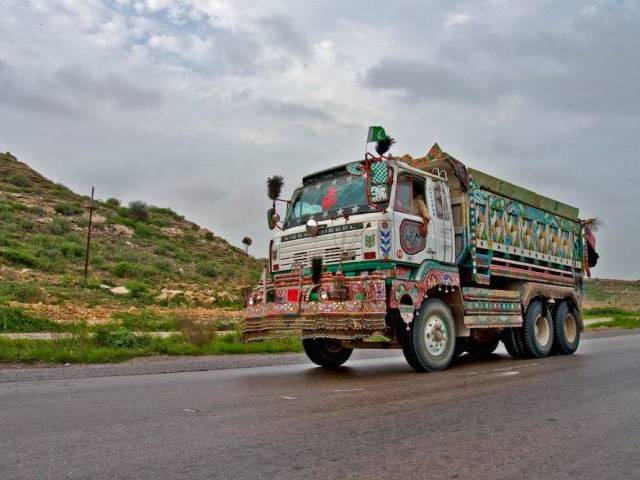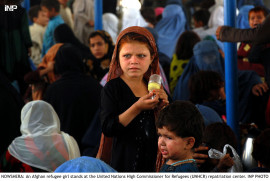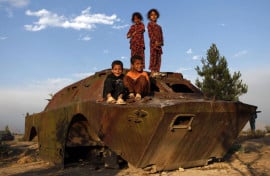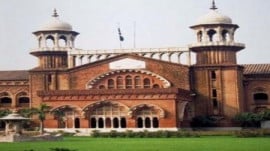
ISLAMABAD: Afghanistan has refuted claims that it has shut down any land route for Pakistani trucks, Afghan President’s special envoy and Ambassador to Pakistan Dr Omar Zakhilwal said on Friday.
The envoy was reacting to reports suggesting that Kabul had barred Pakistani trucks from using the land route for trade with the Central Asian states.
Pakistan an exemplary host to Afghan refugees, says UNHCR rep
Last month, President Ashraf Ghani had threatened to shut Pakistan’s transit route to Central Asian countries if it did not allow Afghan traders to use the Wagah border for trade with India.
Pakistan allows Afghan trucks to unload their India-bound goods at Wagah on the Pakistani side, but Kabul wants the trucks to be allowed to deliver goods at Attari in India.
However, the Afghan ambassador acknowledged that there was a general debate that there should be reciprocal treatment. “But the [Afghan] government has so far resisted the [impulse] to adopt a similar policy regarding transit trade.”
Pakistani trucks, he said, could deliver transit goods directly to Uzbekistan, Tajikistan and Turkmenistan via Afghanistan.
“We have the right to adopt a reciprocal treatment but we do not consider it (to be) in the (best) interest of our people and our country and it is (also) not helpful for Pakistan’s trade,” he said.
“If you visit Torkham, you will see that 70 to 80 per cent of trucks crossing in and out of Afghanistan are Pakistani owned and registered. If you check the trucks at Pul-i-Charkhi area of Kabul you would see Pakistani trucks moving in … both directions,” he maintained.
Afghanistan wins billions in aid pledges at Brussels talks
The Afghan ambassador insisted that Kabul wanted trucks bearing fresh fruit from Afghanistan to be allowed to go till Attari as it would reduce transportation costs, boost Afghanistan’s exports and save fruit from being spoiled.
“We had agreed that our cargo would (be allowed to) go to India and that those goods, which Pakistan import from India via Wagah will also be allowed to be imported via Wagah by Afghanistan. However, this provision has not been implemented,” Zakhilwal said.
Answering a question about peace talks and the future of the quadrilateral process, he said there is a need for a broader regional debate and that Pakistan and China were the only two regional countries previously involved in the quadrilateral efforts.
He said: “The Quadrilateral Coordination Group had made some progress but it could not achieve the required results … A broader regional approach in support of peace process … might as well be the next logical move,” Zakhilwal observed.
Voluntary repatriation
Terming the pace of voluntary return of Afghan refugees encouraging, Safron Minister Lt-Gen Abdul Qadir Baloch underscored the need for greater international assistance for the refugee hosting communities in Pakistan.
Solution to Afghanistan’s predicament appears nowhere in sight
According to him, local communities shared education, healthcare and livelihoods “with their Afghan brothers and sisters”.
“These areas must be reinforced by international help,” he said.
The minister was participating in the ad hoc Quadripartite Steering Committee Meeting on Afghan refugees in Geneva.
The meeting was also attended by United Nations High Commissioner for Refugees Filippo Grandi, Afghanistan’s Chief Executive Officer Dr Abdullah Abdullah, Deputy Interior Minister of Iran Hossein Zolfaghari and Afghanistan’s Minister for Refugees and Repatriation Hussain Alemi Balkhi.
Appreciating Kabul’s policies regarding returning refugees, Baloch reiterated that the voluntary return of Afghan refugees would continue with dignity.
High Commissioner Grandi thanked Pakistan and Iran for protecting millions of Afghan refugees for nearly four decades.
He said that the high-level meetings on the refugee issue in New York in September had paved the way for participation of development actors in refugee situations to relieve the burden on hosting communities.
Afghanistan’s CEO Dr Abdullah Abdullah thanked Pakistan and Iran for hosting Afghan refugees.
Published in The Express Tribune, October 8th, 2016.


































































COMMENTS
Comments are moderated and generally will be posted if they are on-topic and not abusive.
For more information, please see our Comments FAQ